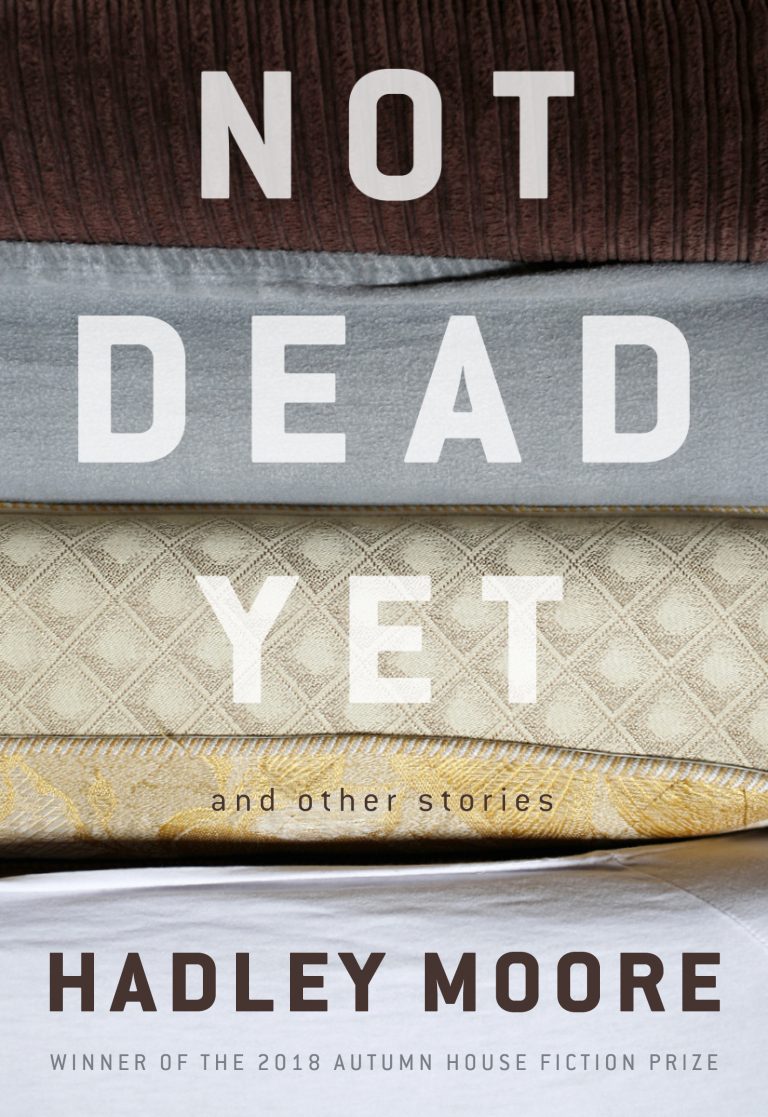 (Autumn House Press, 2019)
(Autumn House Press, 2019)
INTERVIEW BY CAROL SMALLWOOD
__
Not Dead Yet, winner of the 2018 Fiction Prize at Autumn House Press, studies the uncertainties of loss, turning a gaze toward the often-silenced voices of the infirm, elderly, and adolescent. Rich in humor and honesty, Hadley Moore’s debut collection of short stories presents a contemporary set of narratives from a lush cast of characters. We find the protagonists of her stories tenderly revealing their pain after the loss of loved ones and coping with the voids left by the passing of youth, happiness, and fulfillment. ~Autumn House Press
Carol Smallwood: Not Dead Yet has contemporary characters dealing squarely with universal problems. Which of the characters did you find the easiest to write about? How long did it take to complete the collection?
Hadley Moore: I say this all the time, but it is true: the process is so mysterious. For me, it isn’t so much that certain characters are easier or harder to write as that whole stories are. I can look at the table of contents of this book and remember what it was like to draft and revise each story—which I wrote relatively quickly; which went through multiple revisions, sometimes in fits and starts over years; which I thought I might never finish—but I can’t tell you why. The process is likely determined by a combination of how well-formed the idea was to begin with, whether I received useful feedback from a reader on an early draft, how much uninterrupted time I had to work on it, and many other factors related to all the as-yet-unknown ways our brains operate. I just have to accept that when I start a new project there isn’t any way to know how it will go.
This book took about ten years to complete, during which time I also focused on other work. Each story felt like a discreet project, and it didn’t occur to me until I had most of them drafted that I might be heading toward a full collection.
CS: Do you write poetry or nonfiction? When did you begin to write character-centered fiction?
HM: I admire poetry but I don’t write it; everything that comes out of me is a sentence. And if I have an urge to write nonfiction, it’s usually about fiction books or fiction writing, but I haven’t published an essay in years. All of this is to say fiction is my literary home.
In my early twenties, I started dabbling in essays, then I got an MS in journalism, and it was a few years after that that I finally decided to try fiction. I was twenty-nine when I started my master of fine arts (MFA) program.
CS: You shared in an interview with Midwestern Gothic: “There’s an austerity to the Midwest that doesn’t lend itself to self-promotion.” Can you say more about that?
HM: This was in response to a question about why there isn’t so much acknowledgment of a regional school of writing of the Midwest as there is of, say, the West or the South. I don’t have a comprehensive answer, but I do think it has something to do with the unassuming nature of (at least parts of) the Midwest. That’s a stereotype and a sweeping generalization, but there are certainly aspects of truth to it.
CS: How do you manage to include humor, even absurdity, in difficult situations?
HM: It’s just the way my brain works! Not everything I write is funny, but much of it has an element of gallows humor. It’s something that presents itself early in drafting, as part of the tone and a character’s situation or worldview. I like to say my life’s motto is “Laugh or slit your wrists,” which I realize can come off as both overly dark and also flippant, but life is hard. You have to laugh at it.
CS: Do you find male characters more challenging to delineate?
HM: No. I don’t think we’re so different, really, in what motivates us and what we obsess over and what the stakes are in our lives.
CS: In what magazines has your work appeared?
HM: Many literary journals: McSweeney’s Quarterly Concern, the Alaska Quarterly Review, Witness, the Indiana Review, and others. Many of these are housed in and receive support from universities. I keep an updated list on my website.
CS: What is your literary training, background?
HM: I earned my MFA from the wonderful Program for Writers at Warren Wilson College in North Carolina, where my teachers were Maud Casey, CJ Hribal, Erin McGraw, Michael Parker, and Steven Schwartz. They were all excellent. I was very lucky.
I also participated in the Association of Writers & Writing Programs’ Writer to Writer Mentorship Program with the writer Christine Sneed, who has been so generous and encouraging.
CS: What are you working on now and what advice can you share with those wanting to be published?
HM: I’d like to find a home for a novel manuscript I’ve revised several times, and my current project is shaping up to be thematically linked stories about the assassinations of the 1960s.
Persistence is the key. Writing has to be work you would do no matter what. Publishing ambition is great, but artistic ambition must precede it.
CS: Where can readers learn more about your work?
HM: My website is www.hadleymoore.net, and I very recently got on Twitter @HadleyMoore10.
 HADLEY MOORE’s fiction has appeared in McSweeney’s Quarterly Concern, Witness, Amazon’s Day One, the Alaska Quarterly Review, the revived december, the Indiana Review, Anomaly, Quarter After Eight, Confrontation, The Drum, Midwestern Gothic, and elsewhere. She is an alumna of the MFA Program for Writers at Warren Wilson College and lives near Kalamazoo, Michigan.
HADLEY MOORE’s fiction has appeared in McSweeney’s Quarterly Concern, Witness, Amazon’s Day One, the Alaska Quarterly Review, the revived december, the Indiana Review, Anomaly, Quarter After Eight, Confrontation, The Drum, Midwestern Gothic, and elsewhere. She is an alumna of the MFA Program for Writers at Warren Wilson College and lives near Kalamazoo, Michigan.
__
CAROL SMALLWOOD is a literary reader, judge, and interviewer. Her most recent book is Patterns: Moments in Time (Word Poetry, 2019)
![[PANK]](https://pankmagazine.com/wp-content/themes/pank/assets/images/pank-logo-large.png)
